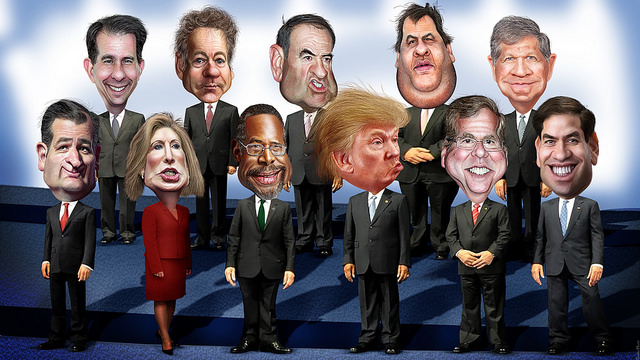An Old Fart Looks at the Big Debate

![]() Creative Commons Licensed Image "CNN Reagan Library Republican Debate" by Flickr user Donkey Hotey. Some rights reserved.
Creative Commons Licensed Image "CNN Reagan Library Republican Debate" by Flickr user Donkey Hotey. Some rights reserved.
1.
The world of rhetoric and declamation was stunned the other day by the announcement that CNN was changing the rules for the second debate of the 2016 season. For weeks, the former leader in cable network news was implying that despite the clamor to open the gates for more contestants, no change was possible. Instead of limiting the cast to ten, an inviolable rule dating all the way back to 2015, the announcement said, there will be 11 people on the stage at the Reagan Library tonight at 8 PM. Have they no respect for tradition at CNN?
Why eleven? Well, it is the start of the football season.
Judging by the media coverage, the Cleveland debate of Aug. 6 was the most important in American history since Lincoln-Douglas in 1858. As thrilling as that was, the second performance of the Republican Debating Society tonight will be even bigger box office.
You know just how big the first precedent shattering 11–person debate in history is by the way CNN is jacking up its advertising rates. The normal rate is $5,000 per 30-second spot. Ad Age reports that CNN will be charging up to $200,000 for the same time slot, 40 times the original rate. God bless Trump, the bean counters say in their evening prayers.
As the crowds swarm in for what may be the Super Bowl of American politics to hear where the GOP Eleven stand on the issues, or only on Mister Vote for Me Because I Am Rich, and the rules being in a state of flux, it occurred to me it might be time for my quadrennial tutorial on debating.
2.
I don’t know how to tell all the new debate junkies who are coming out just to see a 10- against-one tag team event, whatever the number on stage, what they will be seeing is not a debate, but a glorified press conference.
The so-called debates are a sham, a hoax perpetrated on the gullible American public since 1972. It is a mutant created by the sainted League of Women Mothers, I mean Voters, for the 1972 presidential election.
At that point in time, candidates didn’t want to debate on TV. Debates were risky. People could focus on whether you need a shave, as Nixon found out. Sweat underneath the nose was a sign of nerves. Even worse, a candidate could lose in a debate.
A non-partisan organization of do-gooders, the League brokered a compromise candidates felt they could live with. In a massed press conference, with star correspondents like Wolf Blitzkrieg, a perennial interrogator, it was lucky if viewers knew the name of the candidates, no less what they stood, or sat, on the issues.
3.
Okay, Mister Smart Guy, what is a debate?
My memory is shot, but as I recall in pre-historic days it used to work something like this:
Two people would enter a stage. One would say, “My worthy opponent is a lying scum bag, and here’s why.”
The other would say, “Au contraire, my fellow Americans, my otherwise unworthy opponent is a lying dirty mop. And here’s why.”
The two opponents would go back and forth, exploring the nuances of major and minor bones of contention for an hour or seven days, in the case of Lincoln v. Douglas.
Often a real debate serendipitously would uncover interesting differences of opinions. In the long debates prior to the Civil War, for example, a senator made a case that slavery had to continue because it was a critical component of the shipping industry, and that was. His opponent suggested that the shipper find another cargo.
In ye olde fashioned form of debating, the public could compare where the debaters stood on the issues and make judgments accordingly.
With a massed press conference, voters are lucky if they know the candidate’s name. A computer is needed for comparative analysis because all the candidates are not asked the same question by the moderators. The cause of educating the voter is further confused by the revolving door technique popular today, whereby candidates are allowed the flexibility of changing their opinions from week to week, depending on which talk show or venue.
“These are my principles,“ a noted Marxist once said, “If you don’t like them, I have others.” At least Groucho Marx stood by that basic principle.
By the time I finished with enough of these massed press conferences over the years, I was ready to vote for Wolfgang Blitzer for President. The man who reminded me of a U- Boat captain always seemed to be the most knowledgeable on whatever the issue.
4.
To be fair, little did the League realize they would be contributing to befogging the public in the name of clarification?
Little did they realize a generation of millennials would grow up watching TV and other improvements in communications and wind up debate-impaired. A real debate would seem like they were being hassled by too much information.
Little did they realize what will be bringing the wake-me-up- when- its- over crowd in is not a thirst for knowledge but the chance to see a Trumpian meltdown or even fist fights breaking out. These are desperate politicians.
If you are still planning to watch the Republican Debating Society’s round two, keep in mind the warning by a prominent neurologist about the dangers: beware of fracturing a rib or urinating incontinence from excessive laughter.
30
--
Marvin Kitman
September 16, 2015